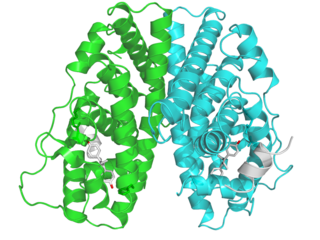A Stanford Study Finds Postmenopausal Estrogen Decline Largely Unrelated to Cognition Changes
By Michelle Brandt
A new study led by a Stanford University School of Medicine researcher shows that decreased estrogen levels after menopause are largely unrelated to changes in cognitive ability and mood. It did find, however, a possible link between levels of another hormone — progesterone — and cognition among younger postmenopausal women.
Estrogen Receptor
The research is the first to investigate associations between sex hormones and cognition in both younger and older postmenopausal women, and to determine whether the hormones affect women differently based on their age and how much time has elapsed since they reached menopause.
The work helps clarify the role of hormones in age-related brain disturbances, lead author Victor Henderson, MD, professor of health research and policy and of neurology and neurological sciences, and his colleagues note in the study, published online Nov. 25 in the Proceedings of the National Academy of Sciences.
Estrogen, the main sex hormone for women, plays a crucial role in a woman’s reproductive cycle and overall health. After menopause, the depletion of ovarian follicles leads to a permanent reduction in a woman’s levels of estradiol (the predominant estrogen before menopause), estrone (the predominant estrogen after) and progesterone, another hormone involved in the menstrual cycle. Several studies have examined the association between hormone concentrations and cognition, but results have been inconsistent.
Some researchers have speculated that the effect of estrogen on cognitive aging might differ depending on when exposure occurs. "Some effects might be more beneficial for younger postmenopausal women closer to the time of menopause than for older postmenopausal women," Henderson said of the so-called "critical-window" hypothesis.
For their study, Henderson and his colleagues analyzed data on 643 healthy postmenopausal women who were part of the ongoing Early Versus Late Intervention Trial With Estradiol. The women, none of whom were on hormone therapy, ranged in age from 41 to 84.
They were sorted into two categories: those who had gone into menopause less than six years previously, and those who had gone into menopause more than 10 years previously. The researchers gave the women a series of neuropsychological tests to gauge their memory and overall cognition. Then, the researchers assessed them for depression and measured their levels of estradiol, estrone, progesterone and testosterone.
Pages: 1 · 2
More Articles
- Attorney General Merrick Garland Testifies: Seventeen Federal Agencies Recognize Decade of Federal Progress Addressing Elder Abuse
- Medicare Advantage Increasingly Popular With Seniors — But Not Hospitals and Doctors
- National Institutes of Health: Common Misconceptions About Vitamins and Minerals
- Julia Sneden Redux: Age Rage; Sometimes You Just Have to Strike Back
- Medical Billing and Collections Among Older Americans
- Selective Exposure and Partisan Echo Chambers in Television News Consumption: Innovative Use of Data Yields Unprecedented Insights
- A Yale Medicine Doctor Explains How Naloxone, a Medication That Reverses an Opioid Overdose, Works
- Women's Congressional Policy Institute Weekly Legislative Update: A Bill to Require the Director of the National Institutes of Health to Conduct an Evaluation of Menopause-related Research
- Kaiser Health News Research Roundup: Pan-Coronavirus Vaccine; Long Covid; Supplemental Vitamin D; Cell Movement
- How They Did It: Tampa Bay Times Reporters Expose High Airborne Lead Levels at Florida Recycling Factory






